MMRDA launches STAMP 2019 to facilitate access to the Mumbai Metro

Mumbai: To promote innovative solutions that will enable public-private partnerships for improved last-mile connectivity, the Mumbai Metropolitan Region Development Authority (MMRDA) in collaboration with World Resources Institute (WRI) India Ross Center and Toyota Mobility Foundation (TMF) jointly launched the Station Access and Mobility Program (STAMP) with other partner agencies Municipal Corporation of Greater Mumbai (MCGM), Mumbai Traffic Police (MTP), Mumbai Metro One Private Limited (MMOPL) and Maharashtra State Innovation Society (MSInS) in Mumbai on Wednesday, 31 July 2019. The STAMP initiative invites applications from diverse audiences such as entrepreneurs, citizens’ groups, professionals, and students for technology-based applications with a focus on crowd management, seamless commuter experience and the increased availability of convenient last-mile services.
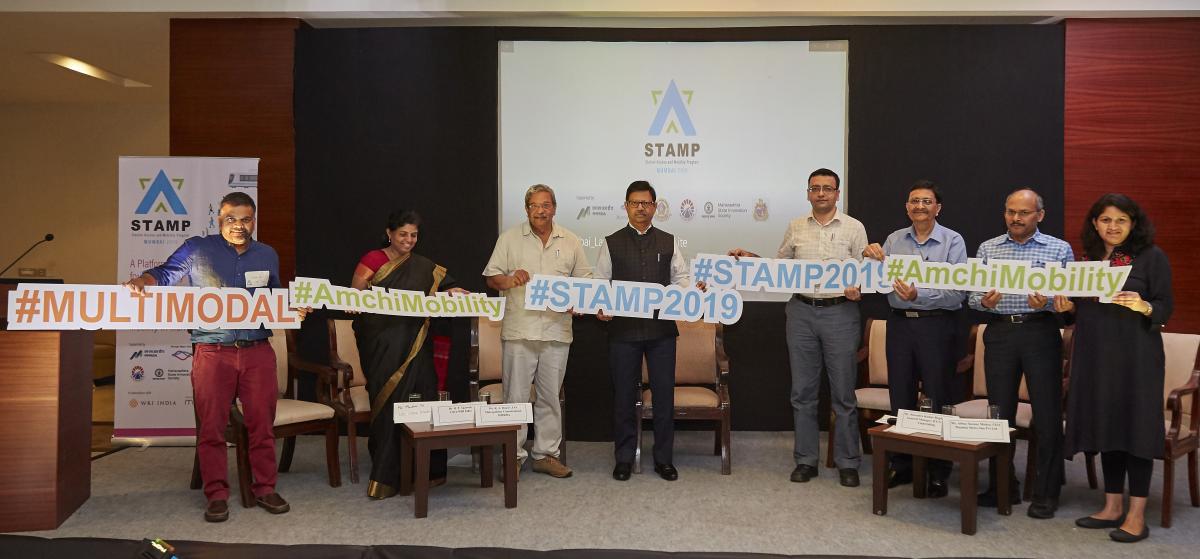
Dr. O. P. Agarwal, CEO, WRI India, Ms. K. Vijaya Lakshmi, Chief, Transport & Communications, MMRDA, Mr. R. A. Rajeev, IAS, Metropolitan Commissioner, MMRDA, Mr. Abhay Kumar Mishra, CEO of Mumbai Metro One Pvt Ltd, Ms. Swathi Rajagopal, Program Manager – India Projects, Toyota Mobility Foundation, along with other WRI India staff, senior officials from MMRC and B.E.S.T, as well as various stakeholders in the mobility sector, participated in the launch event.
The event was kicked off with a welcome address by Dr. O.P. Agarwal, who said, “Don’t think of metros as urban transport projects; we have to start thinking of them as urban transformation projects”. Metro operations should not be limited to two or three corridors, but serve a much larger area, which is only possible with reliable connectivity at each of its stations. Acknowledging the progress of Mumbai Metro Line One, Dr. Agarwal observed that it is one of the few metros where the ridership has exceeded projected numbers. Initiatives like STAMP can supplement feeder systems with existing innovations in more efficient ways, as observed at Byapanahalli metro station, Bengaluru.
In the following session, Ms. K. Vijayalakshmi shared the current mobility landscape and associated challenges in Mumbai city, including MMRDA’s plans for expanding the metro in the next few years. Mr. R. A. Rajeev, as part of his keynote address, called for government agencies to work together and integrate different modes of transport, keeping the metro at the centre. STAMP would play a crucial role in changing the behaviour of commuters, and reducing dependence on private modes of transport in this era of climate change.
MMRDA’s Metropolitan Commissioner also underlined the severity of traffic congestion in the city, where the congestion percentage is 70% at an average speed of 8-10 kms per hour. Till date, the bulk of investments in transport has focused on roadway widening projects and construction of flyovers. However, to alleviate congestion related challenges, public transport must be allocated more resources. In his words, “The share of public transport in the city has to be increased to see visible results.” Mr. R. A. Rajeev urged entrepreneurs applying to STAMP to keep in mind the complexities of urban mobility in Mumbai. For instance, while bike-sharing might be a more sustainable means of travel, it may not be an effective solution for commuters during heavy monsoon rains.
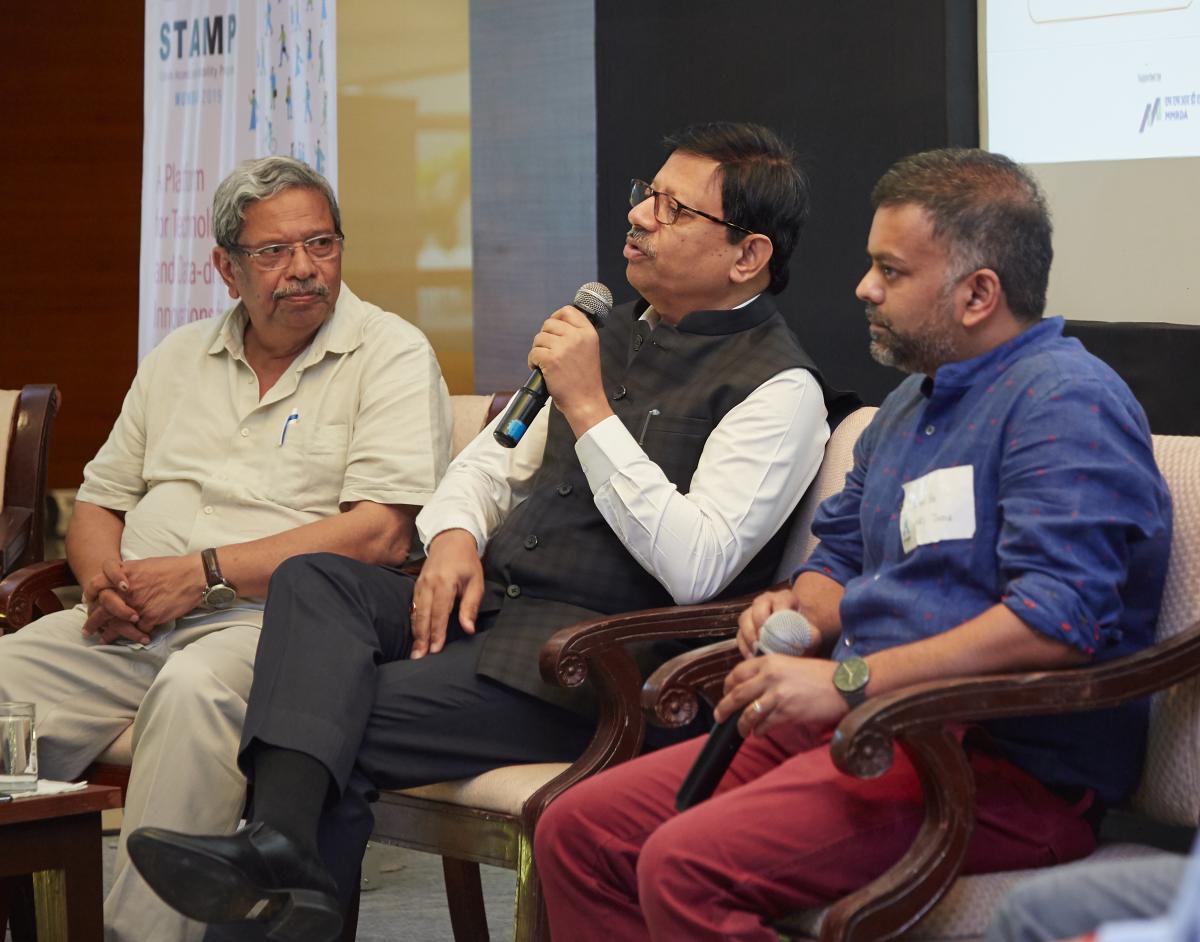
Addressing the audience, Mr. Abhay Kumar Mishra said, “Last mile connectivity is very important. Once a person exits the metro station, how does he or she travel?” To minimize problems faced by commuters, Mumbai Metro One launched programs to clear physical inconveniences in the surrounding areas, such as hawkers on the footpath. He observed that a metro operator must think beyond the metro to be successful. To this end, they introduced shared autos at all metro stations, with Uber and Ola services being integrated at a later point. Mr. Mishra noted that innovation and collaboration are pillars of Mumbai Metro One, and concluded his presentation by highlighting the potential of STAMP -- “I am happy to support STAMP 2019 and its efforts to better the commute of Mumbai passengers.”
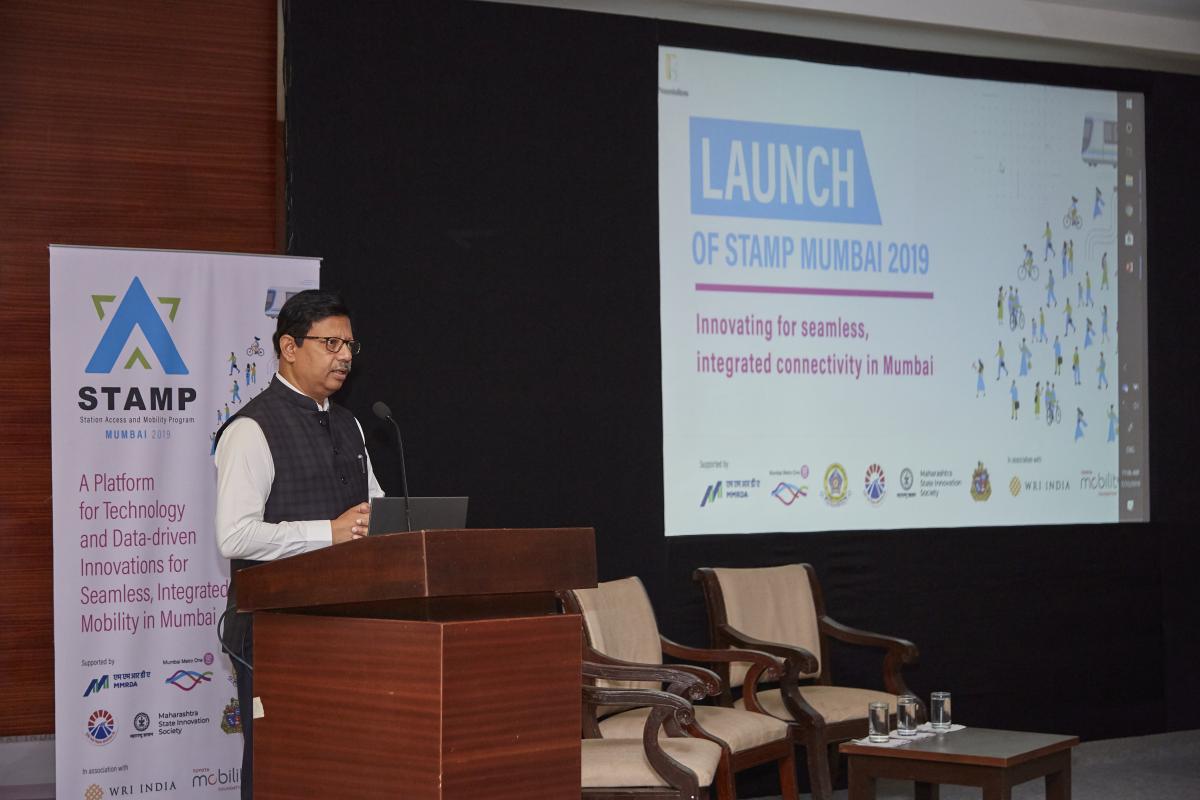
Ms. Swathi Rajagopal provided key insights into the STAMP and TMF engagement, and explained how TMF is exploring the future of mobility at multiple levels including fit-for-purpose mobility solutions, city archetypes, and technologies to enhance clean alternatives for industrial operations. Ms. Rajagopal wrapped up her presentation with milestones from the TMF-WRI partnership via the STAMP initiative, which was created to address metro access through first and last-mile connectivity solutions. Mr. Sudeept Maiti, WRI India, delved further into past learnings with STAMP, focusing on aspects such as building collaboration and pushing forward innovations to make affordable solutions available to commuters.
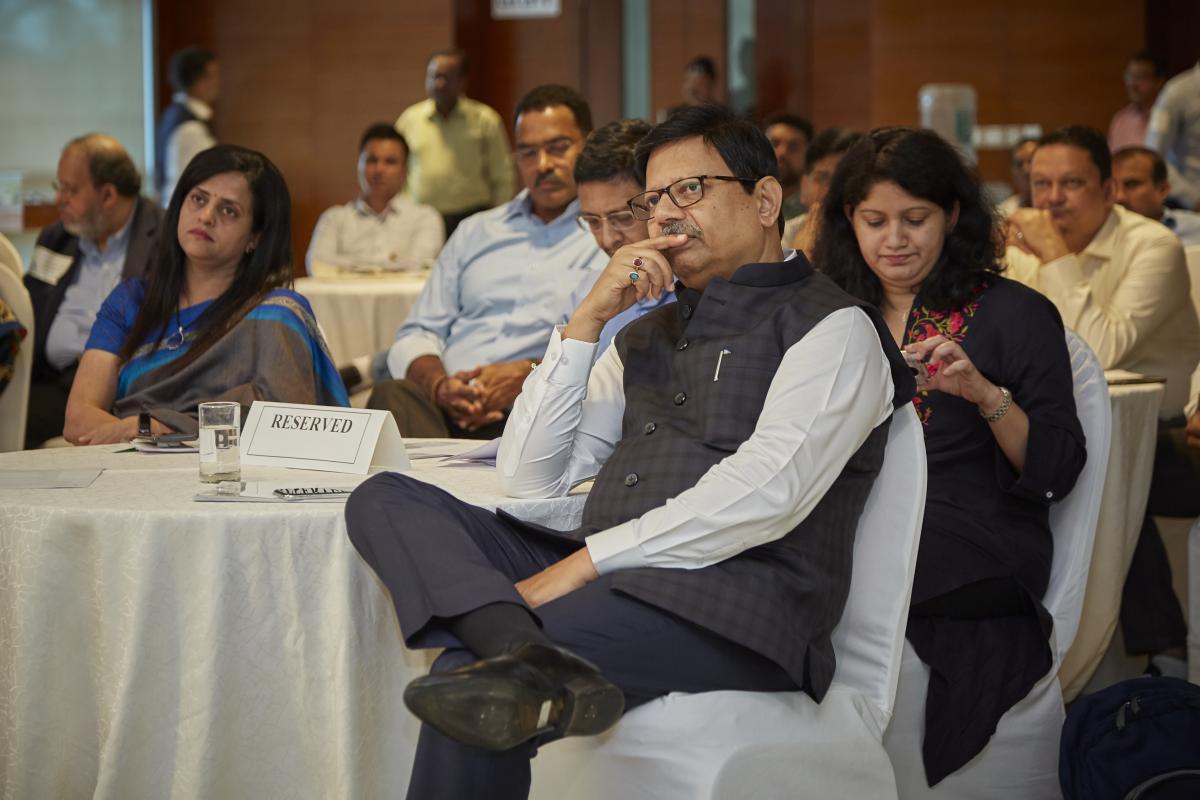
The launch event hosted a panel discussion on ‘The metamorphosis in mobility the Metro is poised to bring and key aspects to enable an integrated city’, chaired by Mr. Madhav Pai, India Director for the WRI Ross Center for Sustainable Cities. The panel comprised Mr. R. A. Rajeev, Mr. Surendra Kumar Bagde, IAS, GM, BEST & Undertaking, Ms. Ashwini Bhide, IAS, MD, MMRC, Mr. Abhay Kumar Mishra, Mr. Chittaranja Swain, IRTS, CTPM, Western Railway, Mr. Yogesh Suresh Patil, Deputy Director, Directorate of Vocational Education and Training, Dept. of Skill Development and Entrepreneurship, Government of Maharashtra and Dr. O. P. Agarwal, The discussion was centred around intermodal integration and had four major themes, i.e. non-motorised access, motorised access, data and payments and station management.
Panel members emphasised the need for a complete digital platform that increases options for commuters and breeds a competitive market to provide the best services to be enabled through STAMP, with support from partner agencies. Conversations also highlighted the need for an efficient and seamless feeder services for first and last mile connectivity, with a focus on technologies like AI for crowd management. The panellists urged participants and entrepreneurs to promote public transport with STAMP solutions. The event concluded with the official launch of the STAMP initiative by Mr. R. A. Rajeev and Dr. O. P. Agarwal, followed by a short video on the focus areas for this year.
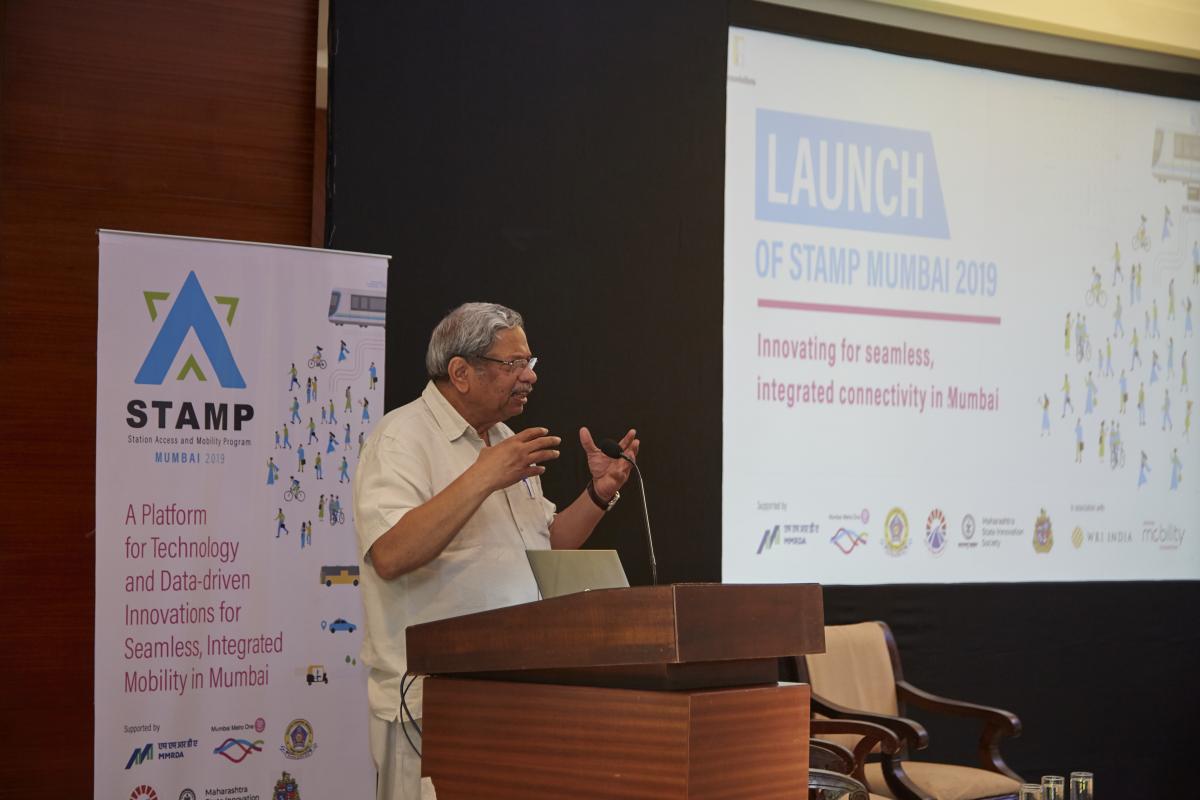
With the launch of STAMP 2019 for Mumbai, the call for applications is now open. This is the fourth edition of the program after successful pilots in Bangalore in 2017, and in Hyderabad and Kochi in 2018. This year, the program will turn its attention towards enhancing the operational efficiency and commuter experience in the Mumbai Metro by looking at stations and its connections with other mass transit networks. The larger focus will be on innovative data and technology-enabled strategies and mechanisms for crowd management, station area optimisation and last-mile solutions.

